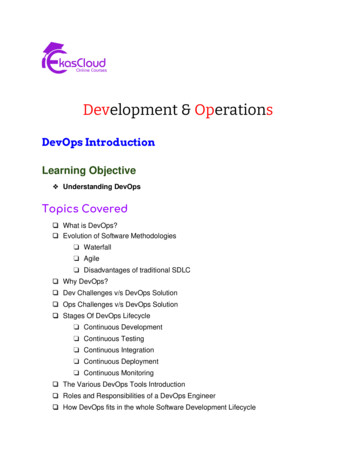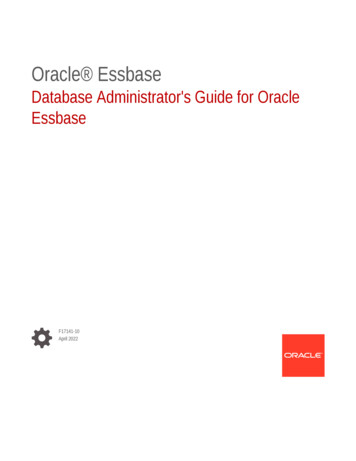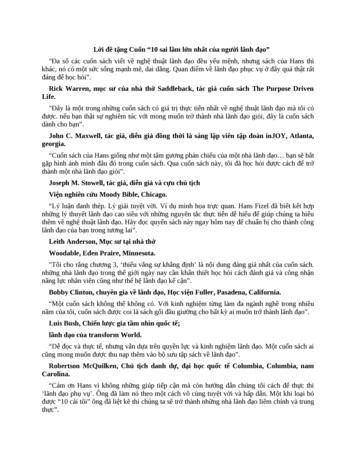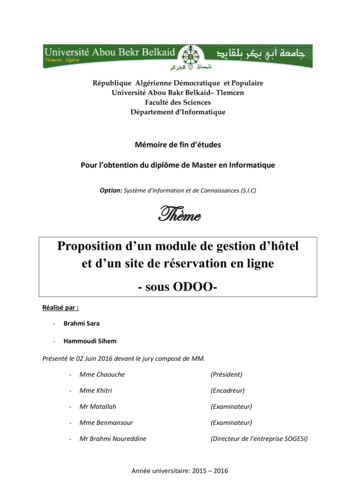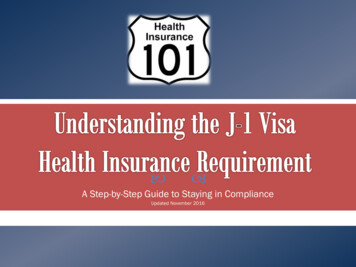
Transcription
A Step-by-Step Guide to Staying in ComplianceUpdated November 2016
As of September 1, 1994, every person in J-1 or J-2 statusis required to maintain a government-mandated minimumlevel of health insurance for the full duration of their stay inJ status. Government regulations stipulate that if J-1students or scholars willfully fail to maintain the requiredlevel of health insurance for themselves or theirdependents, their participation in the J-1 program will besubject to termination. (22 CFR 62.14)
Minimum requirements for alternate insurance plan**: Medical benefits of at least 100,000 for each accident or illness (a higher benefit is better) Medical evacuation in the amount of 50,000, should you need to be sent home on the adviceof a doctor Repatriation of remains in the amount of 25,000, should you die while in the U.S. Coverage must include the semester for which you are at Rice University Minimum 75% coverage for each accident or illness Maximum deductible of 500 per condition per plan year A pre-existing “wait period” limitation of no more than six months The policy must be backed by the full faith and credit of home country government (for thosecovered by their home country's national insurance plan), or the company providing theinsurance must meet minimum rating requirements established by the U.S. government (anA.M. Best rating of "A-" or above, an Insurance Solvency International, Ltd. (ISI) rating of "A-i" orabove, a Standard & Pool's Claims-paying Ability rating of "A-" or above, or a Research, Inc. ratingof B or above). Policy must be in English All exchange visitors and any accompanying dependents may also be subject to therequirements of the Affordable Care Act Policy must be in English** NOTE: Minimum requirements, by law, must be met for all J visa holders. (22 CFR 62.14(b))
Step 1. Verify if you are a Benefits Eligible Employee with your Rice University Departmental Coordinator. Ifyou are benefits eligible, continue reading. If you are not, please follow the directions on the next slideinstead (Slide 5).Step 2. Pick a health insurance plan. As a benefits eligible employee, you can choose the Aetna RiceEmployee Health Insurance Plan or a non-Rice sponsored insurance plan, such as SAS*, Atlas, or ISO. Anyhealth insurance plan you purchase must meet the minimum health insurance requirements set by theU.S. Department of State (see slide 2). Please remember, dependents on J-2 Visas, must also be covered.Step 3. If you decide on the Aetna Rice Employee Health Insurance plan, you will need to set up a meetingwith Human Resources to enroll. You will also need to purchase Medical Evacuation and Repatriation(ME&R) insurance, such as Betins. You will need to purchase this for yourself and any dependents.Step 4. Develop an insurance timeline since you (and any J-2 dependents) must be covered during yourentire J-1 program. Aetna Rice Employee Health Insurance usually starts the 1st of the next month afteryour start date (Example: If you start at Rice on June 15th, your Aetna Rice Employee Health Insurance planwould be effective starting July 1). It is important to confirm your benefits start date with HumanResources. J-1s and J-2s cannot have gaps in insurance so you may need to find additional coverage forthe interim period. Many scholars use daily rate insurance options to cover this gap but you may purchaseany insurance that meets the J-1 heath insurance requirements.Step 5. Verify your coverage with OISS (oiss@rice.edu) at least one week prior to arrival and make sure tobring copies with you to your MANDATORY OISS Check-in.*For the SAS form, please use your Employee/Visitor ID number in the Student ID section. Your Rice University Departmental Coordinator canassist you with finding out your number.
Step 1. You are required to purchase a health insurance plan for you andany J-2 dependents for the entirety of your stay in the U.S. (22 CFR62.14(b)) Any health insurance plan you purchase must meet theminimum health insurance requirements set by the U.S. Department ofState (see slide 2). When thinking about which plan to choose, werecommend discussing with your department and any other colleagues onJ-1s you know here in the U.S. Many scholars choose SAS*, Atlas “Elite”or “Select”, or ISO. For more information on alternate plans, please visitthe OISS webpage.Step 2. Verify your coverage with OISS (oiss@rice.edu) at least one weekprior to arrival and make sure to bring copies with you to your MANDATORYOISS Check-in.*For the SAS form, please use your Employee/Visitor ID number in the Student ID section. Your RiceUniversity Departmental Coordinator can assist you with finding out your number.
With the broad range of choices, the actual cost for health care in theUnited States cannot be measured. Much depends on the level ofinsurance coverage, the number of times the policy holder visits the doctorand/or hospital during his/her stay here. For the basic policies displayed inthe OISS, there is an average monthly cost of 100 for the individual, withan additional 320- 500 per month to include coverage for the spouseand/or children. Be sure to include cost estimates for health insurance inplanning your budget for your expenses during your stay in the U.S. Read the policy information carefully, and don’t be afraid to ask questionsbefore purchasing a policy. Insurance agents make their living from sellinginsurance policies to individuals and groups. If purchasing a policy throughan insurance agent, feel free to ask questions and take the time to learnabout and understand several choices before making a decision. Don’tsign anything if you are uncertain or confused. Consult a knowledgeablefriend, your academic department, or the OISS for help.
The reliability of the company. Plans offered through Rice or approved by NAFSA shouldbe from reliable companies. Plans advertised outside of our campus should be checkedout with someone who is familiar with that company. The recommendation from theperson selling the insurance is not always sufficient in order to make a good decision asto which policy to buy. Companies vary in their level of service to customers, how promptlythey pay claims, and if they pay the full amount expected by their policy holders. Deductible amounts. Most insurance policies require their holders to pay part of theirhealth expenses themselves (called the deductible) before the company pays anything.Under some policies the deductible is a yearly figure, and the holders must pay up to thatamount only once each year. Under other plans, the deductible must be paid each timethere is an illness or injury. The J regulations require that you select a policy where thedeductible is no more than 500 per accident or illness, but many policies offer a lower,more advantageous one. In choosing insurance, think carefully about how much you canafford to pay out of your own pocket each time you are sick or injured, and weigh thedeductible against the premium before you decide. Co-insurance. Usually an insurance policy only pays a percentage of the medicalexpenses, even after the deductible is paid. The policy might pay 80%, for example, andthe remaining 20% (which holders still have to pay) is called the co-insurance. Forexample: 3,000 in medical expenses covered by a policy with a 400 deductible and a20% co-insurance would cover 2,080 of your expenses and require you to pay 400 indeductible and 520 in co-insurance. The J regulations require that insurance policy youchoose must pay at least 75% of covered medical expenses.
Life/per-occurrence maximums. Many insurance policies limit the amount they will payfor any single individual’s medical bills or for any specific illness or injury. ExchangeVisitors must have insurance with a maximum no lower than 50,000 for each specificillness or injury, which may be enough for most conditions. Major illnesses, however, cancost the patient several times that amount. Benefit periods. Some insurance policies limit the amount of time they will go on payingfor each illness or injury. In that case, after the benefit period for a condition has expired,the policy holders must pay the full cost of continuing treatment of the illness, even if theyare still insured by the company. A policy with a long benefit period provides the bestcoverage. Exclusions. Most insurance policies exclude coverage for certain conditions. The Jregulations require that if a particular activity is part of your Exchange Visitor program,your insurance must cover injuries resulting from your participation in that activity. Forexample, if a person comes to the U.S. to conduct chemical experiments, s/he would haveto be covered for laboratory accidents. Finally most insurance companies do not pay fortreatment of what they consider to be pre-existing conditions. That is, if the policy holderwas previously diagnosed and/or treated for a problem before purchasing the insurance,the new insurance policy will not pay for continued treatment of that problem. For thosewho suffer from chronic conditions (ex: high blood pressure, diabetes, high cholesterol) orthose who have pre-existing conditions (ex: cancer, pregnancy), travel insurance policiestypically will not cover those medical needs or medications and therefore are notrecommended options.
Do I have to have health insurance, that meets the J-1 visa requirement, for the full duration ofmy stay in the U.S.?o Do my dependents have to have health insurance, that meets the J-1 visa requirement?o oYou can purchase with a credit card for most plans. The University Aetna health insurance plans arededucted from your paycheck.What if I extend my stay – what do I do about the health insurance requirement?o Although we will only accept health insurance plans, that meet J-1 Visa requirements, there are aplethora of companies out there with plans. Make sure that you read over the policy, understand thecoverage you are receiving, understand the claims process, as well as where to go in case of emergency.How do I pay for health insurance?o If you are benefits eligible, most of the requirements can be met by your Aetna Rice Employee HealthInsurance plan with additional insurance needed for Medical Evacuation and Repatriation.If you are a complimentary academic visitor, you can purchase insurance, through a company like SAS.Please see slide 4 for more information.How can I find out what my health insurance covers?o For the full duration of your program with Rice University.Where can I go to get health insurance for myself and my dependents?o Yes, as per (22 CFR 62.14(h))For how long must my dependents have health insurance?o Yes, as per (22 CFR 62.14(b))You will need to also extend your health insurance for you and any dependents, as per (22 CFR 62.14(b))How do I find a doctor?oConsult your health insurance plan and most likely that plan’s website.
The Office of International Students and Scholar Services is here toassist you with making sure you are in compliance with the J-1 Visahealth insurance requirement. If you have questions, please feelfree to:o Call our office: 713-348-6095o Email us: oiss@rice.eduo Visit our website: http://oiss.rice.edu/scholarhealthinsurance/o Schedule a meeting: OISS is located in Lovett Hall, Entrance A, 2ndFloor. To schedule a meeting, please call 713-348-6095 or emailoiss@rice.eduWelcome to Rice University!
Pick a health insurance plan. As a benefits eligible employee, you can choose the Aetna Rice Employee Health Insurance Plan or a non-Rice sponsored insurance plan, such as SAS*, Atlas, or ISO. Any health insurance plan you purchase must meet the minimum health insurance requirements set by the U.S. Department of State (see slide 2).



